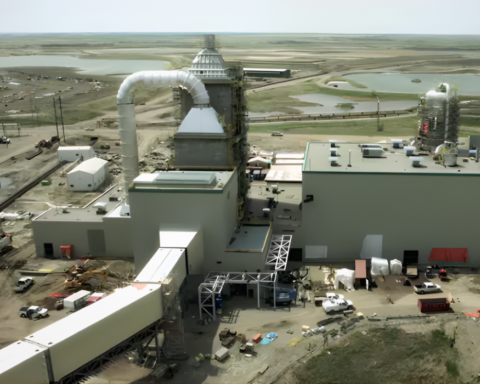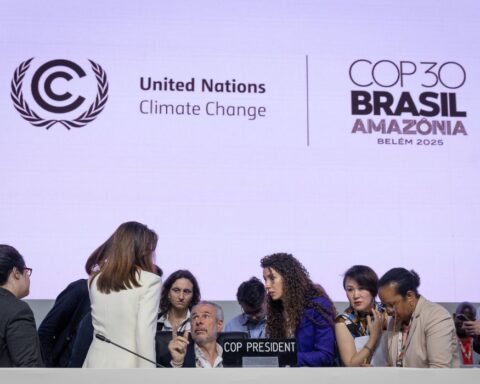If Canada’s heavy industry is going to make the massive investments required to get anywhere close to net-zero, it will need more ambitious and predictable policies from government.
That’s what representatives from the cement, aluminum, hydrogen and power sectors told a conference in Ottawa last week, warning that failure to make those investments will erode the country’s competitiveness over time as the world accelerates joint action to limit the destructive impacts of climate warming.
The session on the challenges for Canada’s competitiveness under net-zero scenarios was hosted by the Canadian Climate Institute and the Net-Zero Advisory Body. The two federally supported bodies provide analysis and advice to Ottawa on climate economics and policy issues.
Last month, the Net-Zero Advisory Body recommended that the federal government ratchet up its ambitions and set a 2035 target for Canada to reduce emissions by 50% to 55% below 2005 levels on the way to a net-zero goal by 2050. The federal government has committed Canada to reduce greenhouse gas emissions by 40% to 45% by 2030 and must set a 2035 target by December 1.
The Canadian Climate Institute, together with Clean Prosperity and the International Institute for Sustainable Development, will soon launch a Commission on Carbon Competitiveness that will provide analysis on how Canada can attract the investment needed to reduce emissions most efficiently while protecting our existing industries and building the new clean energy sectors.
The institute gathered industry players at the conference to kick off the conversation. Asked about the biggest risk to carbon competitiveness, industry spokespeople pointed to political and policy questions. “It’s the uncertainty,” said Ivette Vera-Perez, president of the Canadian Hydrogen Association. “To make investment decisions, you want that long-term view and an understanding of what the future is going to look like.”
Adam Auer, president of the Cement Association of Canada, agreed: “Uncertainty is the biggest thing that we worry about. We’re obviously very aware of some of the uncertainty that is being generated by the political narrative around the robustness of some of the climate policies that exist today,” he said. “But there is also a larger uncertainty about where the market is going.”
At the federal level, Prime Minister Justin Trudeau is facing an election that could come any time between now and fall 2025 after the New Democratic Party pulled its support for an agreement that propped up the Liberal minority government. Conservative Party Leader Pierre Poilievre is eager to topple the government, particularly given the large lead his party enjoys in the polls.
We’re obviously very aware of some of the uncertainty that is being generated by the political narrative around the robustness of some of the climate policies that exist today.
–Adam Auer, president of the Cement Association of Canada
Poilievre has vowed to kill the carbon tax, but it is unclear whether he will target only the consumer levy or also eliminate the federal backstop on industrial carbon pricing and leave it to provinces to manage their own systems. The Liberal government plans to increase the tax from $80 per tonne of carbon dioxide this year to $170 in 2030.
The Conservative leader hasn’t specified the fate of other Liberal climate policies, including investment tax credits, clean fuel standards and clean electricity regulations, though he has consistently opposed Liberal actions on those fronts.
Industry warns that costly government policies shouldn’t get ahead of markets. Auer noted that customers for commodities like cement, aluminum and hydrogen are currently unwilling to pay a premium to suppliers with lower carbon intensity. As a result, it remains unclear whether investments in emissions reduction will pay off. Some jurisdictions such as the European Union are moving forward with border measures that would penalize higher-carbon sources and provide some return for decarbonization efforts.
Auer said that investors with his member firms are increasingly worried about their carbon intensity. The ability to attract capital depends to some extent on the companies’ ability to show they have a “robust, credible path to decarbonization.” Companies need to balance those competing pressures, he said.
Quebec advantage
The race to net-zero can be accomplished only if governments, corporations and energy utilities can manage it without dramatically driving up costs to consumers, Michael Sabia, chief executive officer at Hydro-Québec, told the conference. Indeed, it is that affordability issue – which became more acute with post-COVID inflation pressures – that Poilievre is exploiting with his “Axe the tax” approach.
Hydro-Québec is a key player in the province’s drive to its 2050 net-zero goal. In order to reduce fossil fuel use and attract new manufacturing in Quebec, the provincial utility plans to increase its clean-electricity capacity by a third, even as it subsidizes its customers’ investments in energy efficiency.
Globally, investment in the clean energy transition must average $4 trillion annually – up from $1.5 trillion in 2023 – to meet the 2050 goals. That investment is required “both to address the challenge of decarbonization but also to seize the opportunities of building new industries that can ensure prosperity in a low-carbon world,” Sabia said.
The only real question is not whether it’s going to happen but whether it happens in a relatively smooth way or not.
–Michael Sabia, CEO, Hydro-Québec
The challenges faced by Hydro-Québec are illustrative of the global hurdles on the road to transition. The utility needs to invest between $150 billion and $180 billion to meet its 2035 goals, Sabia noted. On a yearly basis, that’s three times its current investment. Its workforce of 10,000 people would grow to an average of 35,000, and a peak of 55,000 workers through the investment cycle. Hydro-Québec is attempting to recruit skilled francophones from countries like Morocco and Algeria to meet those labour needs.
For all the pieces to fall into place, the permitting of projects must speed up, Sabia said. Canada has the second-worst record in the OECD (Organisation for Economic Co-operation and Development) for length of project permitting. At the same time, the province and Hydro-Québec itself will need to pursue new partnerships with Indigenous people in whose traditional territories much of the work will be done, he said.
The world has seen tremendous progress in clean energy development, but 80% of the world’s energy is still supplied by fossil fuels, Sabia noted. “Clearly, decarbonization is going to happen; it has to happen. The only real question is not whether it’s going to happen but whether it happens in a relatively smooth way or not.”







